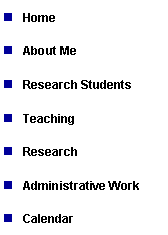
|
Muhammad Abid |
|
Professor |


|
EE–612: Diagnosis and Fault Tolerant Control |

|
Instructor |
Muhammad Abid Room # SE–302, Ext: 3440 |
||||||||
|
|
|
||||||||
|
Course |
Course Code and Title: EE–612 Diagnosis and Fault Tolerant Control Level: Graduate Pre–requisite: EE–501, EE–601 or equivalent Course Website: www.pieas.edu.pk/abid/index_files/DFTC.htm Course Material: Click here |
||||||||
|
|
|
||||||||
|
Course Objectives |
1. Modeling of faults 2. Detection, isolation and identification of faults 3. Fault tolerant control systems design |
||||||||
|
|
|
||||||||
|
Learning Outcomes |
This course will enable the students to analyze the risks of fault and failures and applies the remedies to avoid the losses. They will be able to detect faults, identify the location of faults and its magnitude. They will also be able to apply fault tolerant techniques to control systems. |
||||||||
|
|
|
||||||||
|
Recommended Text |
1. Ding S. X., Model-based Fault Diagnosis Techniques, Design Schemes, Algorithms, and Tools. Springer, 2008. 2. Blanke M., Kinnaert M., Lunze J., and Staroswiecki M., Diagnosis and Fault Tolerant Control. 2nd edition, Springer, 2010. 3. Chen J. and R. Patton R. J., Robust Model-Based Fault Diagnosis for Dynamic Systems. Boston, MA: Kluwer, 1999. 4. Isermann, R., Fault-Diagnosis Applications: Model-Based Condition Monitoring: Actuators, Drives, Machinery, Plants, Sensors, and Fault-tolerant Systems, Springer, 2011 |
||||||||
|
|
|
||||||||
|
Computer Usage |
Every week, there will be a lab seesion in computer center. Students will program the fault diagnosis algorithms and simulate the systems. There will be extensive use of MATLAB/Simulink throughout the course. |
||||||||
|
|
|
||||||||
|
Assignments |
There will be regular assignments during the session; most of them will be computer–based. Each of these assignments will be due in the following lecture. Late submission and copied assignments will not be accepted. |
||||||||
|
|
|
||||||||
|
Examination |
There will be one sessional exams and one terminal exam; the dates will be announced by the course-coordinator/examination cell. There will be 4–5 quizzes during the lecture hours; most of these quizzes will not be announced in advance. There will be semester mini projects (both theoretical and implementation). Students will be required to deliver presentations on their work. |
||||||||
|
|
|
||||||||
|
Grading |
|
||||||||
|
|
|
||||||||
|
Course Contents |
Importance of the subject; some basic concepts; fault, failure, fault detection, fault isolation, fault identification, modeling of faults in technical systems; Classification of fault detection techniques; hardware redundancy based, signal based, analytical model based, qualitative model based, Residual generation techniques; observer based approaches, parity space approach, parameter identification based approach, Residual evaluation and threshold computation; Norm based methods, statistical methods, integration of norm based and statistical methods, Integrated design of fault detection systems; Fault isolation schemes; Fault identification schemes; Fault tolerant control, control reconfiguration for sensor and actuator failures, handling of fault recovery transients. |
||||||||
|
|
|
||||||||
|
|
|